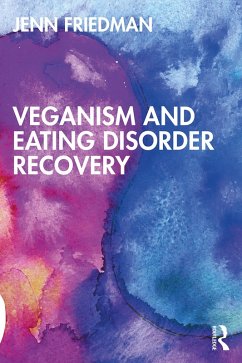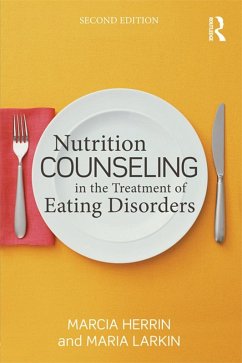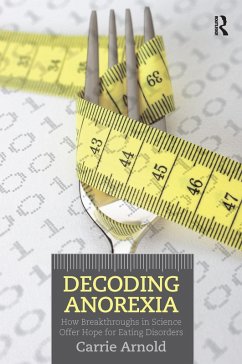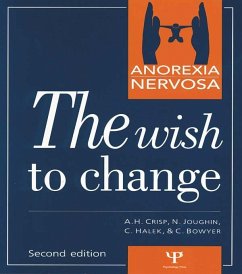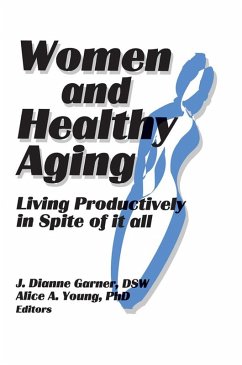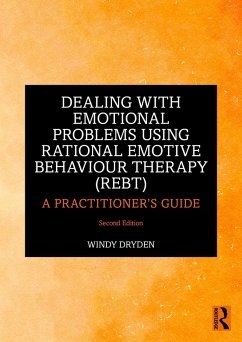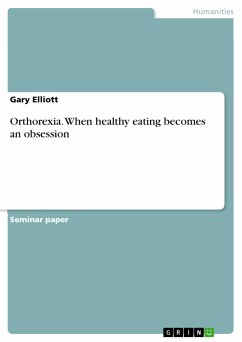
Orthorexia. When healthy eating becomes an obsession (eBook, PDF)
Versandkostenfrei!
Sofort per Download lieferbar
Statt: 17,95 €**
13,99 €
inkl. MwSt. und vom Verlag festgesetzt.
**Preis der gedruckten Ausgabe (Broschiertes Buch)
Alle Infos zum eBook verschenkenWeitere Ausgaben:

PAYBACK Punkte
0 °P sammeln!
Seminar paper from the year 2010 in the subject Psychology - Clinical Psychology, Psychopathology, Prevention, ( Atlantic International University ), language: English, abstract: The term 'Orthorexia' was first coined in 1997 by Dr. Steven Bratman. The combination of the Greek words 'orthos' meaning correct or right and 'orexis' meaning appetite gives the lose definition of correct eating; prior to coining the term Bratman (2007) previously referred to Orthorexia as "righteous eating". Predominantly, the primary focus is eating healthy food. In addition to healthy eating, Battaglia purports th...
Seminar paper from the year 2010 in the subject Psychology - Clinical Psychology, Psychopathology, Prevention, ( Atlantic International University ), language: English, abstract: The term 'Orthorexia' was first coined in 1997 by Dr. Steven Bratman. The combination of the Greek words 'orthos' meaning correct or right and 'orexis' meaning appetite gives the lose definition of correct eating; prior to coining the term Bratman (2007) previously referred to Orthorexia as "righteous eating". Predominantly, the primary focus is eating healthy food. In addition to healthy eating, Battaglia purports that orthorexics "obsess" over the quality of the food they eat more than the quantity. Not uncommon to many 'diet plans', the orthorexic places high importance on large quantities of fruit and vegetables in the eating plan, but often will fixate on eliminating what they deem 'bad' foods; some sufferers trying to "completely eliminate fat, sodium and carbohydrates" from their diet (www.waldenbehaviouralcare.com). Dr Bratman affectionately refers to orthorexics as 'healthfood junkies', unfortunately this rather tongue-in-cheek term does little to relay the seriousness and potentially life-threatening nature of the disorder. In Dr Ingrid van Heerden's paper Orthorexia- a new eating disorder? Catalina Zamora describes this disorder as a "pathological obsession for biologically pure food". The obsession in this disorder stems from the restrictive nature of the person's relationship with their food. What usually begins as a healthy diet progressively becomes more and more restrictive as additional items are removed from the diet; this deprivation of food items in the diet can have adverse effects on the orthorexic. Research was conducted at the Universita degli Studi di Roma La Sepienza in 2004; of the 404 subjects in the study, scientists concluded that 7% of them suffered with orthorexia (www.eating-disorder.com). Giving prudence to this research, Ellin (2009) explains that Dr James Greenblatt has seen an estimated 15% increase in this form of behaviour among his young patients. One of the major complications with Orthorexia is that it is not really considered to be a medical condition and as such does not have criteria for diagnosis. It is often perceived to be another form of anorexia nervosa or possibly a sub-type of obsessive-compulsive disorder; at the very least, some medical practitioners are in agreement that the associated behaviour "explains an important and growing health phenomenon" (www.pamf.org). What are the causes of Orthorexia?
Dieser Download kann aus rechtlichen Gründen nur mit Rechnungsadresse in A, B, BG, CY, CZ, D, DK, EW, E, FIN, F, GR, HR, H, IRL, I, LT, L, LR, M, NL, PL, P, R, S, SLO, SK ausgeliefert werden.




